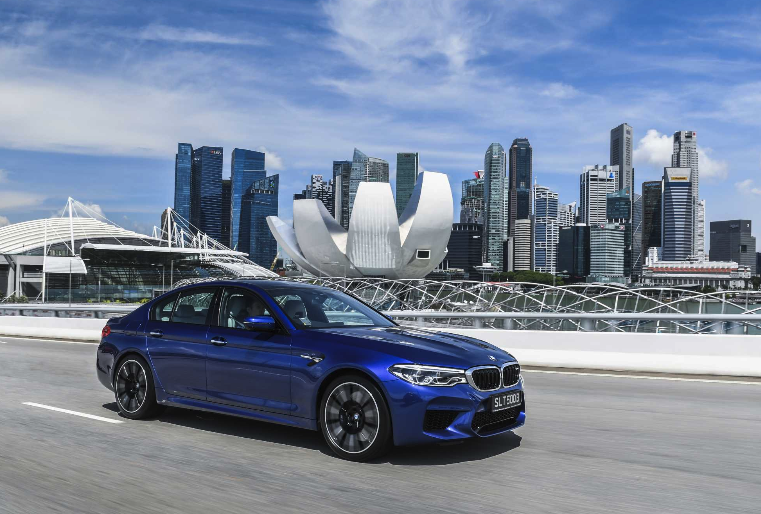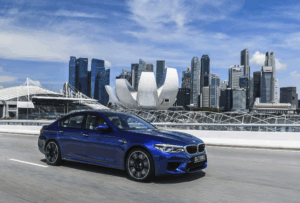SINGAPORE — BMW has reinforced its status as Singapore’s leading premium carmaker, holding the No. 1 position in the luxury segment and ranking No. 2 overall in the city-state’s car market for the first nine months of 2025, according to new figures from BMW Asia. The company also says it has secured nearly half of Singapore’s premium electric-vehicle market over the same period.
The regional unit reported that BMW Singapore’s sales rose 4 percent year-on-year in the third quarter and 6 percent for the year to date through September, while BMW Vietnam posted a striking 40 percent jump in the quarter, underlining Southeast Asia’s growing importance to the Munich-based group.
Lars Nielsen, managing director of BMW Group Asia, framed the results as a validation of the brand’s premium positioning and its push into battery-electric vehicles, saying customers are responding both to the products and to a “360-degree” ownership experience that stretches beyond the showroom.
Local Media Cast Singapore as a BMW Stronghold
Singapore’s automotive press has treated the announcement as confirmation that BMW has entrenched itself at the top of the city-state’s luxury hierarchy.
Enthusiast outlet OneShift reported that BMW “stayed as Singapore’s #1 premium automotive brand and #2 overall,” highlighting the company’s nearly 50 percent share of the premium EV segment and the 4 percent rise in third-quarter registrations.
AutoApp, another local portal, struck a similar tone, describing BMW’s performance as a continuation of its dominance in the premium ranks while competitors jostle for position in a fast-electrifying market.
Earlier in the year, sgCarMart noted that BMW and its Mini brand together already commanded about half of the premium EV segment in the first half of 2025, foreshadowing the latest YTD September numbers.
The domestic narrative sits against a broader shift in Singapore, where electric vehicles accounted for just over 40 percent of new car registrations in the first quarter of 2025 — a share boosted by generous charging infrastructure and tax incentives, as well as strong volumes from Chinese brands such as BYD alongside Tesla and BMW.
German Coverage: Singapore as a Showcase Market
In Germany, where BMW’s global strategy is followed closely, specialist media have begun to treat Singapore as an indicator of how the brand can thrive in tightly regulated, high-cost markets.
Earlier this year, BMW-focused site Bimmertoday described BMW Singapore as “auf Erfolgskurs” — on a successful course — noting hefty growth in 2024 sales despite what it called “astronomical” car prices in the city-state and more than a doubling of local EV deliveries.
German financial and automotive outlets have also used such regional success stories to frame BMW’s broader electric transition. Börse am Sonntag, a German markets publication, pointed to robust EV sales growth and resilient margins in early 2025 as evidence that BMW’s gradual, profit-focused electrification strategy can work even in a choppy global market.
At the same time, coverage in German business and regional papers has stressed how crucial the company’s new “Neue Klasse” EV platform — debuting with the iX3 SUV — will be to sustaining that momentum worldwide, from Europe to China and Southeast Asia.
In that context, BMW’s near-50-percent share of Singapore’s premium EV segment offers a convenient case study for German commentators: a high-income, infrastructure-ready market where premium buyers are already moving quickly into electric drivetrains.
A Test Bed for BMW’s Premium EV Strategy
The strong result in Singapore also resonates with BMW’s global narrative. Analysts note that while overall EV demand has been uneven across markets, uptake in the premium segment has been comparatively resilient, especially among buyers with access to home charging and company-car schemes — a pattern mirrored in German surveys of dealer expectations.
Singapore’s tightly controlled vehicle quota system, along with high taxes and certificate-of-entitlement costs, makes the market small in absolute terms but highly visible in positioning: success there signals that affluent customers are willing to pay a premium for electric models if brand, technology and experience align.
BMW Asia is leaning into that idea. The company has paired its EV push with lifestyle events, brand experiences and digital services meant to keep owners inside the BMW ecosystem long after the sale — a strategy that Nielsen has described as “creating emotional connections throughout the ownership journey.”
Regional Growth, Global Competition
Beyond Singapore, the 40 percent third-quarter growth reported in Vietnam suggests that BMW sees Southeast Asia not only as a showcase but also as a volume opportunity, even as Chinese brands intensify competition across the region.
Globally, BMW faces mounting pressure from Chinese EV makers that are increasingly setting the pace on software and pricing, particularly in China itself, its largest single market.
For now, though, BMW’s commanding lead in Singapore’s premium segment — and its near-half share of the country’s premium EV market — is being read by both domestic and German observers as a welcome bright spot: proof that the company’s mix of brand cachet, new electric products and high-touch customer experience can still win the luxury race, even as the rules of the road are rapidly rewritten. (hb)
Photo: BMW


